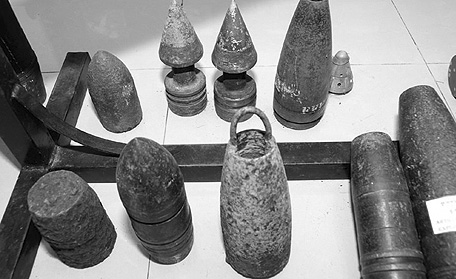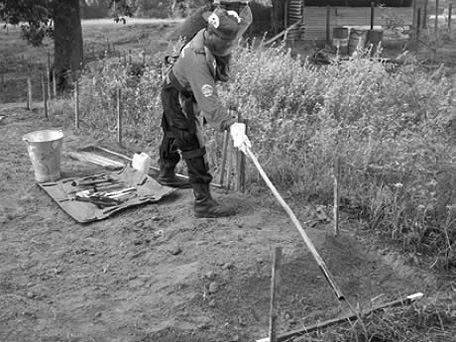Japan's Official Development Assistance White Paper 2011
(5) Unexploded Ordnance (Including Cluster Munitions), Antipersonnel Landmines, and Small Arms and Light Weapons, etc.
In post-conflict regions, unexploded ordnance including cluster munitions and antipersonnel landmines remain, and illegal small arms are still widespread. These remnants of war indiscriminately harm children and other members of the general public, and not only hinder reconstruction and development activities, but can also become the cause of new conflicts. It is important to provide support that takes into consideration the security concerns of the affected country, through assistance including the removal of unexploded ordnance and landmines, the collection and disposal of illegal small arms, and the empowerment of victims of landmines.
<Japan's Efforts>
Regarding cluster munitions, the Convention on Cluster Munitions came into force on August 1, 2010, with 66 State Parties including Japan, (108 countries have signed as of November 2011.) Japan has proactively contributed to the promotion of the Convention. For example, at the First Meeting of States Parties to the Convention on Cluster Munitions held in Laos in November 2010, as Vice President of the Meeting as well as Friend of the President on universalization, Japan has been engaging in outreach activities to advance universal adherence to the Convention. Japan is taking solid steps to implement the Convention's obligations including international cooperation and assistance.
As for antipersonnel landmines, Japan has worked toward the universalization of the Convention on the Prohibition of the Use, Stockpiling, Production and Transfer of Anti-Personnel Mines and on Their Destruction (Ottawa Convention), through provision of assistance for measures against landmines and technical development. After the Second Review Conference to the Ottawa Convention in 2009, Japan announced the following comprehensive approach (i) partnerships with victim countries (and individuals), (ii) joint efforts by the private sector, the public sector, academia, and civil society for the landmine problem, and (iii) measures against landmines, and the development of affected regions.
To tackle the issues of small arms and light weapons, Japan provides support for the collection, disposal, and appropriate storage and management of small arms, in combination with development assistance. Japan also supports for the development of relevant legal systems, the improvement of the abilities of customs agencies, police forces, and other law enforcement agencies, and the disarmament and social reintegration of former soldiers and child soldiers, with the aim of strengthening the ability to manage and police the import and export of weapons and improving security.

Landmines that were dug up and displayed in the office of the Cambodian Mine Action Centre as part of the "Project of Strengthening CMAC's Function" in Cambodia (Photo: Stefan Janin/JICA)
[Sri Lanka]
"The Project for Manual Demining in Kilinochchi District"
Grant Assistance for Grass-Roots Human Security Projects (November 2010 - Current)
The domestic conflict that had continued in Sri Lanka for approximately 26 years came to an end in May 2009, but many landmines and unexploded ordnance remained chiefly in the northern region that had been the main battlefield, and a large number of people have been living as refugees, and unable to return to their homelands. Japan has contributed a total of over $20 million in grant assistance for grass-roots human security project to remove landmines in Sri Lanka. In 2010 Japan supported for a local NGO to conduct landmine removal activities in Kilinochchi District, which had a particularly high number of landmines remaining. These activities are expected to let over 4,000 people to return to their villages, and restart farming and other works of their lives. In addition, landmine removal activities have created employment in former regions of conflict, where there had been a high rate of unemployment. The project working together with the minority Tamil and the majority Sinhalese is also contributing significantly to the racial reconciliation.

Manual landmine removal work(Photo: Delvon Assistance for Social Harmony (DASH))
